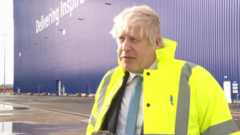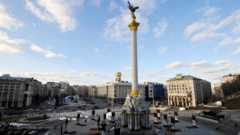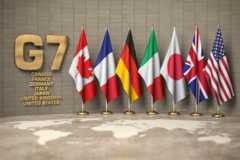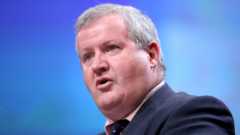13:28
Johnson adds that his defence secretary was "right to say" that the West must be united against Russian aggression.
Asked if he agreed with Ben Wallace's claims there was a "whiff of Munich" and appeasement in actions against President Putin so far, the UK prime minister insists he was "absolutely right to say it's very important that we've got to be strong, and we've got to be resolute and we've got to be united."
He says it is particularly important to show a united front when it comes to economic sanctions.
"The UK, as you know, has been in the lead in bringing our allies together so that there's a tough package of sanctions," he says.
"It's very, very important that the West should stand united, particularly that Nato has done it.
"It's been pretty encouraging to see the way countries have pulled together."
UK Prime Minister Boris Johnson says the "evidence is pretty clear" that Russia is planning an invasion of Ukraine.
On a visit to Scotland he says there are troops massing on the Ukrainian border and "all sorts of other signs that show that there are serious preparations" going on.
He says this is a "a very, very dangerous, difficult situation" but "there is still time for President (Vladimir) Putin to step back".
He is calling for more dialogue and urges Russia to avoid a "disastrous" invasion.
The UK is among the countries urging its citizens to leave Ukraine now while there are still commercial means available - but there is no government repatriation scheme in place.
Wizz Air is continuing to operate all of its flights to and from Ukraine as normal but says it is closely monitoring the situation.
It is advising passengers with booked flights to regularly check for further information.
On Sunday, KLM said it would stop services to Ukraine and Germany's Lufthansa is also considering suspending flights.
According to data company Cirium, there were 3,776 scheduled flights into Ukraine from European airports in January, with 98 from the UK.
Cirium says Ryanair was the largest airline flying between Europe and Ukraine, followed by Wizz Air. The BBC has contacted Ryanair for comment.
Many carriers have avoided eastern Ukraine since the downing of Malaysia Airlines flight MH17 in 2014 and there are relatively few planes over Ukraine itself.
If you're just joining us or need a recap here's the latest on the tensions between Russia and Ukraine.
- Russia has gathered about 100,000 troops close to Ukraine's borders and a reported 30,000 more are engaged in military exercises in Belarus. Russia denies it plans to invade Ukraine
- More than a dozen countries, including the UK and the US, are urging their citizens to leave Ukraine
- The UK's armed forces minister says he believes Europe is closer to war than it has been for 70 years but there are still opportunities "to let diplomacy win through"
- The German Chancellor is set to meet the Ukrainian President in Kyiv later as part of efforts to defuse tension
- Russia wants assurances Ukraine will never be allowed to join Nato - the world's most powerful regional defence alliance - but its members oppose this
- Leaders from the G7 group of the world's richest countries warn Russia will face "massive" economic sanctions if they invade
- Ukraine's PM says his government is offering £420m to airlines to keep flights going through the uncertainty
The Kremlin says it does not view a comment by Ukraine's ambassador to the UK that the country could be "flexible" on its ambition to join Nato as an official change in policy.
Ambassador Vadym Prystaiko was forced to walk back his comments on Monday morning after telling the BBC on Sunday that Kyiv might be prepared to drop its bid to join the Western military alliance in a bid to avoid war with Russia.
Prystaiko clarified on Monday that Ukraine would not be reconsidering its ambition to join Nato after officials in Kyiv rejected his comments.
But Russian President Vladimir Putin's spokesman Dmitry Peskov says Ukraine renouncing its Nato ambitions would significantly ease Moscow's security concerns.
In Monday's newspapers many Russian outlets reject western accusations of aggression towards Ukraine and adopt a defiant tone in the face of western sanctions.
The popular pro-government daily, Izvestia, carries comments from military commentator Vladislav Shurygin, who claims ongoing army drills with Belarusian forces are "peaceful," but notes they should serve as a warning to the Ukrainian government that its war with Russian backed separatists can't be won through "force".
Kommersant, an influential business newspaper, tells its readers that "Moscow does not rule out that Ukraine or some third party is preparing to stage a provocation in Donbas in order to draw Russia into a war".
And the Moskovsky Komsomolets newspaper mocks western countries for their decisions to evacuate citizens and embassy staff over the weekend.
"The US and the EU are taking to their heels from Kyiv," it says, comparing it to previous situations in Vietnam and Afghanistran.
Elsewhere, many outlets focus on moves in the Russian parliament, the Duma, to call on President Vladimir Putin to recognise the Moscow backed separatist regimes in Ukraine, the self-proclaimed Donetsk and Luhansk People’s Republics.
UK Labour party leader Keir Starmer is calling for tougher sanctions for Russia over the Ukraine crisis.
Speaking on a visit to Sunderland, in north-east England, he says: "I'd like that threat [of sanctions] to be very real because let's see this for what it is. It's Russian aggression.
"So, I would say to the Government go further on sanctions."
He adds: "Russia wants to see our allies divided, it wants to see division in the United Kingdom, and we are not going to divide and, therefore, we support the government in what it's doing."
He says Parliament should be recalled if Russia invades Ukraine because there must be "a swift and strong" response from the UK, and "a united response with our allies".
The UK has already expanded its powers to impose sanctions against Russia if it invades Ukraine, so it could target a broader range of individuals and businesses.
He’s only been in the job for two months and Olaf Scholz has yet to develop the diplomatic clout of his predecessor Angela Merkel. But the quietly spoken new German chancellor is said to be a skilled negotiator and, for this week at least, he’s the European face of what many believe are now last-ditch attempts to de-escalate the Ukraine crisis.
Today’s visit to Kyiv is intended as a show of support. Although Germany continues to rule out the delivery of lethal weapons to Ukraine, Chancellor Scholz may promise other equipment and increased financial aid.
But the focus in Berlin - and beyond - is on tomorrow’s talks with Vladimir Putin in Moscow. Scholz will repeat the position of Western allies - that Russia will pay a heavy price if it invades Ukraine. But he’s also said to be determined to find a route to de-escalation and will continue to promote the so called Normandy format, under which Germany, France, Russia and Ukraine have previously sought a ceasefire in eastern Ukraine.
Government sources in Berlin have played down expectations of a significant breakthrough, with efforts concentrated on maintaining dialogue at what they describe as a critical and very dangerous moment.
Ukraine doesn't feel like a country getting ready for war.
It's a crisp morning in Kyiv, there aren't soldiers standing on street corners, there aren't sandbags being piled up, there are no military checkpoints.
The capital city is not deserted and people are going to work as normal. I've seen people meeting friends for coffee and breakfast.
There are no visible preparations for a Russian invasion and the story at the moment is still political - the hope is it stays that way.
There are no signs yet that anything is going to happen this week.
Leaders from the G7 group of nations say the Russian military build-up on the Ukrainian border is a cause for "grave concern", and warn they are prepared to impose a huge package of economic sanctions should Moscow decide to invade its near neighbour.
In a statement issued on Monday morning, finance ministers from the group of the world's wealthiest democratic nations - including the UK, US and Germany - say their immediate priority "is to support efforts to de-escalate the situation".
However, they warn that if Russia ramps up military action, the group is prepared "to collectively impose economic and financial sanctions which will have massive and immediate consequences on the Russian economy".
"We, the G7 Finance Ministers, underline our readiness to act swiftly and decisively to support the Ukrainian economy, while also supporting the ongoing efforts to urgently identify a diplomatic path towards de-escalation."
Western nations have repeatedly warned Moscow that any invasion of Ukraine will provoke a crippling economic response, with German Foreign Minister Annalena Baerbock saying last week that Berlin is willing to "pay a high economic price" should sanctions be required against Russia.
However, over the weekend Viktor Tatarintsev, Russia’s ambassador to Sweden, scoffed at the promise of western sanctions, claiming that President Vladimir Putin was undaunted by threats.
He added that “the more the West pushes Russia, the stronger the Russian response will be”.
With tensions growing in Eastern Europe, the role of Nato is crucial in our understanding of Russia’s troop build-up at the Ukraine border and the subsequent reaction to it from the West.
Ros Atkins explains the significance of the alliance, and how its past and future have influenced the current situation.
Video conten
Western politicians are using more and more striking language to describe the confrontation over Ukraine.
The UK armed forces minister, James Heappey, says Europe is closer to war than it has been for 70 years.
Germany’s vice chancellor Robert Habeck, too, says Europe is on “the verge of war”.
The defence select committee chairman, Tobias Ellwood, compares the stand-off to the 1962 Cuban missile crisis.
The Defence Secretary Ben Wallace makes comparisons to failed diplomacy before World War Two.
On one level, they are reflecting the briefings and intelligence they are getting, largely from the Americans, which suggest that a Russian invasion could happen any time.
This is based on the growing number of Russian forces around Ukraine and the way they are configured, all of which – the US says – show preparations for invasion, not routine exercises.
But on another level, these remarks also echo the clear western strategy to be as transparent about the scale of the threat they claim Russia poses.
They want the Kremlin to know the West is aware of what is being considered and knows the potential risks that are involved. Hence the historical allusions and the warnings of the dreadful consequences that may follow any military action.
Ian Blackford MP, leader of the Scottish National Party in Westminster, says his party is "very, very concerned" about the tensions between Russia and Ukraine.
Earlier, the SNP's Westminster leader told Sky News: "We must say to Russia, to President Putin and his supporters that they must draw back."
Blackford went on to say "This is a worrying moment, the potential threat of an incursion of Russian troops in Ukraine almost doesn't bear thinking about in terms of...what that would mean for the Ukrainian people.
"We must absolutely reiterate we stand with them."
He warned there would need to be a "very direct response" if Russia was to invade, with "sanctions at the absolute highest level" imposed in these circumstances.
"This would be a crime against humanity, it would be a crime of war, and we can't stand back," Blackford said.
Downing Street had said it was too early to say whether the Ukrainian ambassador's comments suggesting his country could be "flexible" on its ambition to avoid Nato represented a genuine climbdown.
They were right to wait - because the diplomat has clarified his comments this morning.
He said the aspiration of Nato membership remained in the country's constitution.
The Ukrainian government is seeking clarity from the Kremlin about the purpose of its troop movements, under an international treaty.
Efforts to avoid a conflict are today in the hands of the German Chancellor Olaf Scholtz, who is visiting Kyiv and Moscow.
Prime Minister Boris Johnson is planning his own face-to-face diplomacy across Europe later this week.
No 10 says there is still "a window of opportunity" for de-escalation - but that's more in hope than expectation, with the US warning a Russian invasion of Ukraine could be mounted as soon as Wednesday.
Ukraine has pledged increased funding to airlines in a bid to keep its airspace open to commercial flights, the country's prime minister says.
Denys Shmygal says the government had allocated 16.6bn hryvnia (£420m) to guarantee the continuation of flights through its airspace.
"This decision will stabilise the situation on the market of passenger air transportation and will guarantee the return to Ukraine of our citizens who are currently abroad," he says, without specifying how the funds would be allocated.
The move comes amid moves by several western airlines to end services to the country.
Dutch airline KLM said on Sunday that it was terminating services to Ukraine and the German airline Lufthansa said that it was considering following suit.
Nato - the North Atlantic Treaty Organisation - is the world's most powerful regional defence alliance.
Its 30 members - which include the UK, US, Canada, France and three former Soviet republics - agree to come to one another's aid in the event of an armed attack against any one member state.
Ukraine is not a member of Nato. But, it is a "partner country" and may be allowed to join the alliance sometime in the future.
Russia sees this potential partnership as a direct threat to its security, arguing that Nato's expansion eastward breaks a promise made by the US in 1990.
Western claims of an imminent Russian invasion into Ukraine are being dismissed within Russia as hype.
I wouldn’t say that Russians are being prepared psychologically for imminent war but there is a nervousness creeping in here.
Some liberal voices are expressing concern that the Kremlin is taking Russia down the path to a large scale conflict with Ukraine.
But I think many Russians still don’t believe that a major escalation by Moscow is likely, largely because state television - which is incredibly powerful in shaping public opinion - continues to dismiss such claims.
The president of Estonia - a Nato member since 2004 - says preventing countries from joining the Western military alliance is "out of the question" because Nato has always had "an open door policy".
Russia wants assurances Ukraine will not be allowed to join Nato - but the alliance's members have said this is not up for debate, and Ukraine says the ambition is enshrined in its constitution.
Alar Karis tells the BBC the current situation is "extremely serious" and "tensions are extremely high".
He warns that while there is no direct threat to Baltic states or Nato countries, a conflict in Ukraine would affect the whole of Europe, with the possibility of cyberattacks and migration from Ukraine.
Deploying Nato troops to Ukraine would probably be inflammatory, he says, and that the "window of opportunity" for dialogue should be kept open - although he concedes this has not been very successful so far.
Ukraine's Foreign Ministry says comments by the country's ambassador to the UK suggesting it could be "flexible" on its ambition to join Nato were "taken out of context".
The ministry says the prospect of joining the Western military alliance remains "enshrined in the constitution".
"The key for our country is a security guarantee and the best guarantee would be the immediate joining of Nato," it adds.
Despite a recent uptick in diplomatic efforts, relations between Moscow and Washington are "lying on the floor", a Kremlin spokesman tells Russia's Ria news agency.
Dmitry Peskov notes that while channels between the two countries remain open, he says when it comes to "bilateral relations, one can only talk about negatives. We are at a very, very low point".
"The heads of state are in dialogue, there is dialogue on other fronts," Peskov concedes. "This is a plus because you know that just a couple of years ago there was zero dialogue, there were no such contacts whatsoever."
The comments come amid reports that Russia has amassed around 130,000 troops on the border. Ukraine and several western countries, including the US, have warned their citizens to leave the country immediately.
Such warnings saw the value of the Russian currency, the rouble, fall sharply on Monday morning, erasing gains made over the previous two weeks.













